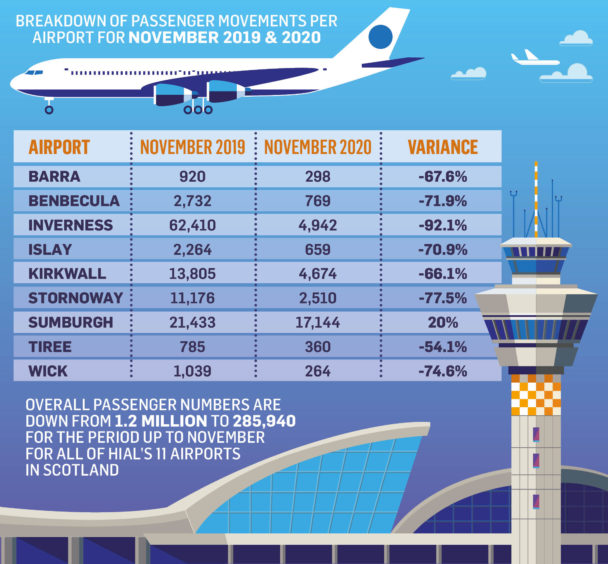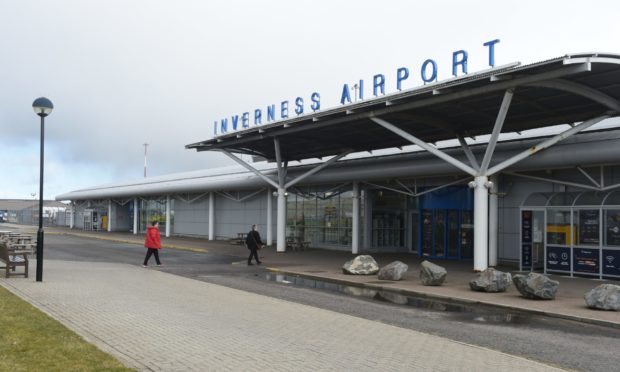The number of passengers travelling through north airports has dropped by one million since April because of Covid.
The latest figures show that, for November alone, there were only 32,460 passengers, which is 72.7% fewer than the 119,090 who travelled using Highlands and islands facilities in November 2019.
The running total for the current 2020/21 financial year – from April – consists of 285,940, compared to 1.2 million in the months of April to November during the 2019/20 financial year.
This is a reduction of almost 78%.

Inverness suffered the biggest drop, down 92.1% from 62,410 to just 4,942 passengers.
It comes as new testing arrangements are being rolled out to prevent people with coronavirus from flying into the UK and spreading the illness.
While airport chiefs have welcomed the move, they maintain that it has come too late and that extra financial support is desperately needed to help the struggling sector survive.
Highlands and Islands Airports Ltd (HIAL) chief executive, Inglis Lyon, said: “Like all airport operators, HIAL has been severely hit by Covid and hopefully we may see some improvements this year, but it could take several years to reach previous levels of passenger movement.”
Orkney MSP Liam McArthur said: “The pandemic has undoubtedly caused serious uncertainty for the entire aviation sector this year.
“However, these figures put into sharp focus the significant impact that it has had on HIAL and services closer to home.
“Airline travel is a lifeline for our island communities and these essential connections will play an important role in ensuring that our islands can rebuild following the pandemic.
“It is therefore vital that services are safeguarded and supported on the back of this difficult year.”
Highlands and Islands Conservative MSP Edward Mountain added: “These passenger figures are a stark reminder of how much the pandemic has impacted our airports and aviation industry.
“Many of these airports are a lifeline to remote communities and local businesses.
“It is vital that the Scottish Government ensure everything is in place to build back better after the pandemic.”
Highlands and Islands Labour MSP Rhoda Grant said the sector will need to be at full-strength for the anticipated return of international tourists this summer.
She added: “Theses figures are to be expected given the restrictions on travel under Covid 19 measures, no one is going to be surprised and the aviation industry is to be commended for how it has responded to such a large public health crisis.
“Where our focus needs to be now is helping the aviation industry to recover from the unprecedented pressures that it has been through in 2020.
“The airline industry supports hundreds of jobs in the Highlands and islands and will prove key to getting the tourism industry back on it’s feet as the region works to recover from the hardships of this year.
“In August there were stark warnings that the industry was on the brink of collapse without well-structured support from Scottish Government, and while they have managed to stagger along it should not be underestimated the work and support that the SNP will need to put into ensuring that Scotland builds back a healthy, environmentally responsible industry which often provides lifeline services – these numbers are testament to that.”
All airports in the north are suffering massive reductions, although Sumburgh has fared slightly better, with November’s figures dropping by 4,289 to 17,144 from 21,433.
This is due to the volume of helicopter traffic servicing the oil and gas industry. Otherwise the statistics for the Highlands and islands show a fairly consistent drop across the board.
Stornoway experienced a massive decline of 77.5% from 11,176 to 2,510.
Barra was down from 920 to 298, Bencbecula from 2,732 to 769, Kirkwall from 13,805 to 4,674, Tiree from 785 to 360 and Wick from 1,039 to 264.
